Crossword Solver
Explore Crossword Solver for instant solutions to your favorite crossword puzzles. You can search by given clues, discover today’s puzzles, and access expert help.
Today’s Featured Puzzles
How Crossword Solver Works
Looking for crossword puzzle answers today or for past solutions? Crossword Solver handles all crossword types.
Enter Crossword Clue
Enter your crossword clue, and the tool generates a list of possible words.
Select Word Length
To get better results, give the word length of the answer.
Enter Known Letters
If you already know some letters you can easily search for the remaining.
Discover More Puzzles
Featured Articles
A place for crossword enthusiasts, trending topics, and educational articles.
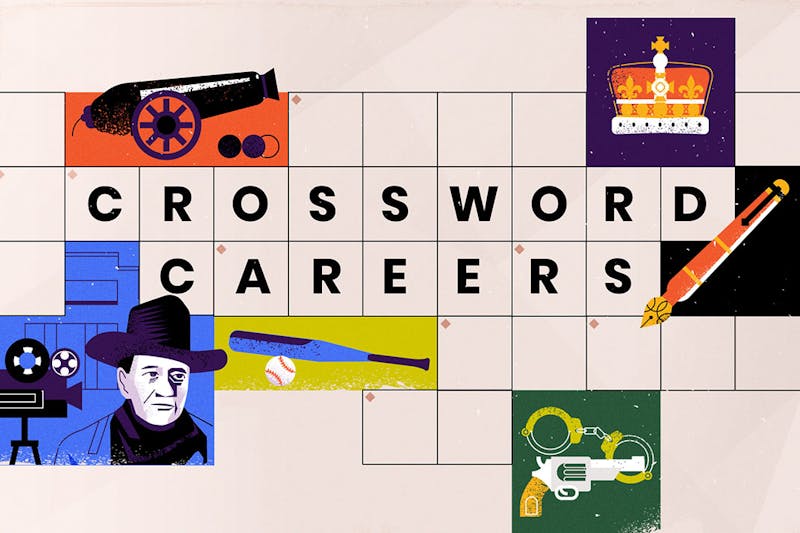
What Types of People Do Newspapers Mention on Their Crosswords?

Books Around America: Uncover the Books Set Nearest to You
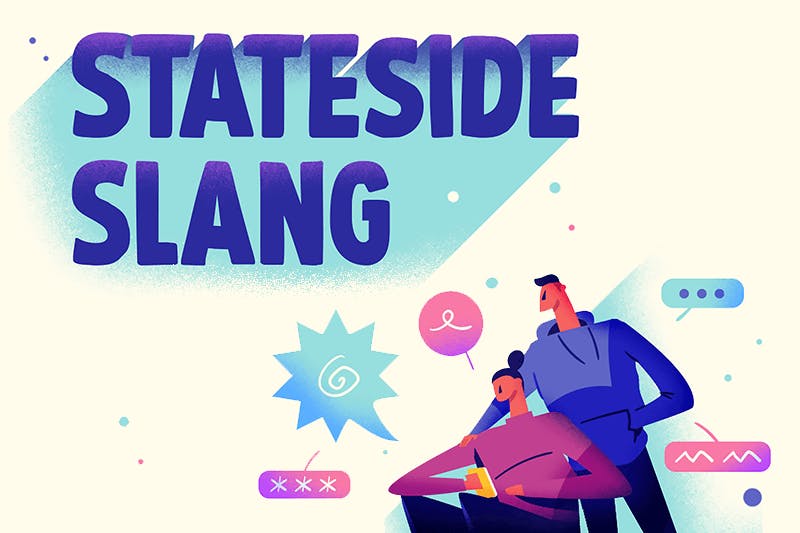
Fresh Clues From Recent Puzzles
Popular Trending Clues
How to Be an Expert Crossword Puzzle-Solver
Want to become the ultimate crossword puzzle-solver? Let us help you find answers to crossword puzzles with our online crossword solver, whether you have a word on the tip of your tongue or just need one clue. Crossword puzzle answers for today can be found easily, so you don’t have to wait for the next day’s newspaper or cheat on an app to find out the solutions!
Use this crossword helper to enter crossword clues, search for specific words by the number of letters, or read our guide to learn new, different strategies for solving your daily crossword. Help is finally here in our ultimate guide to crossword puzzle-solving!
Our ultimate guide has everything, like where to find crossword games, how to solve crosswords, the most common crossword clues and answers, and other fun facts about America’s favorite word-puzzle game. Nothing is more maddening than a crossword clue that’s difficult to understand, but don’t worry! Enter that tricky crossword puzzle clue into our tool and you’ll find yourself in crossword heaven!
Table of Contents:
Solving Common Crossword Clues
Using our word-finder, crossword fans can easily enter the clues that are stumping them and let our word-grabber find several different options. There are two main strategies for getting crossword puzzle help: enter in the clue and have our crossword-tracker grab answers, or try out our word solver to find the specific word by the letters you have and size of the space you need to fill in.
Search Crossword Clues and Find Answers
Get specific crossword clue help by learning answers you’re likely to need. Here are a few common examples:
- Starbucks Sizes: tall, grande, venti, and trenta
- Capital of Norway: Oslo
- “Thank You” in French: merci
- “Hello” in Chinese: nĭ hăo
- Unctuous: oily, sleek, greasy, soapy, slimy, smarmy, flattering, lying
- Greek God of War: Ares
- April Zodiac Sign: Aries
- 8 in Roman Numerals: VIII
- Half-Man, Half Horse: centaur
The 30 Most Common Crossword Answers Every Word Puzzle Fan Should Know [Infographic]
Crossword-writers are known for their wit, subtlety, and wordplay. Crossword-solvers are frequently known for scratching their heads in confusion at out-of-date or uncommon terms that are used because they so often make a great fit on the board. These crossword quiz answers might not be used in everyday speech, but they’re used often in crossword puzzles. In fact, there’s a word to describe this: “crosswordese.” These are the top 30 most commonly used crossword clue answers.
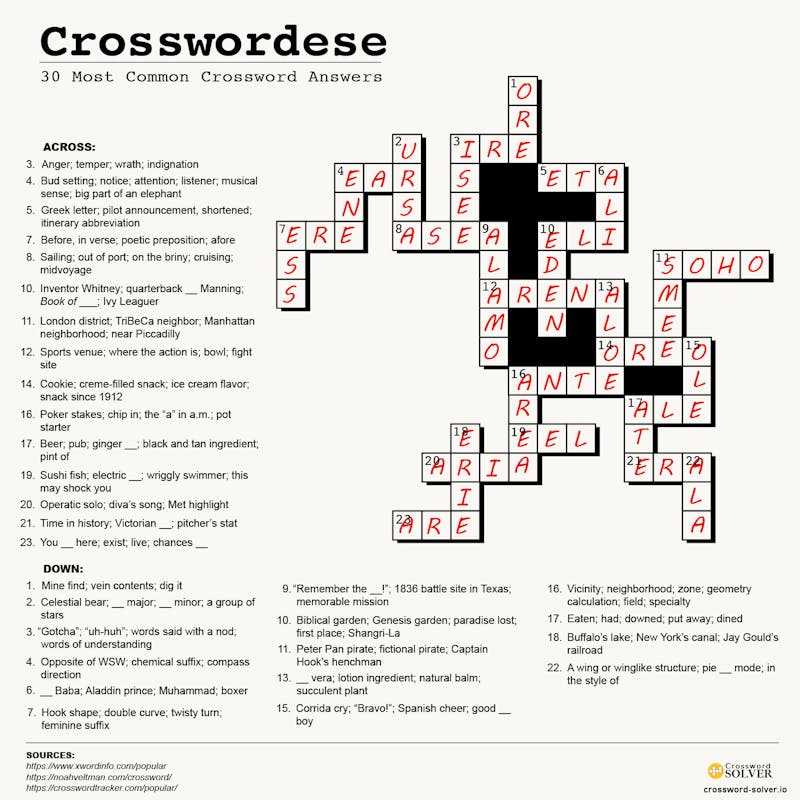
Where to Play Crossword Games Online
Here’s a quick overview of the best free crossword puzzles that you can find online, either on mobile devices or your desktop. We recommend playing on a tablet; that way, it’s easier to read most crossword puzzle games. Free puzzles can be found with difficulties ranging from easy to hard. For instance, one can find pretty easy online crossword puzzles from USA Today, but if you really want a hard puzzle, pick the New York Times crossword on Saturday.
Remember that if you get stuck on your daily crossword, answers can be found easily with our clue-finder!
Newspapers With Free Online Crossword Puzzles
- New York Times Crossword: Answers for this world-famous puzzle get more difficult to figure out throughout the week, with the easiest on Monday, the hardest on Saturday, and a larger, more iconic puzzle with a moderate difficulty level on Sunday. They’re frequently themed. You can download an app for the NYT mini-crossword that’s a lot of fun as well.
- LA Times Crossword: Solution-finding is just as hard with this paper, originally founded in 1881. People frequently ask, “What are the answers to today’s LA Times crossword?”
- USA Today Crossword: Besides free crosswords, USA Today also offers other games, like sudoku and mahjong.
- Washington Post Crossword: Their daily crosswords are free and fun to play. They also have a “Monthly Meta Crossword” that’s themed.
- WSJ Crossword: The Wall Street Journal’s puzzles are, in their words, “America’s most elegant, adventurous, and addictive crosswords.” They’re frequently themed and can be quite difficult to figure out crossword solutions for.
- AARP Crossword: AARP members can compete for top scores.
- Boston Globe Crossword: This New England newspaper has its own fun crossword puzzle game.
- Newsday Crossword: One man, Stan Newman, has been editing these puzzles for more than 30 years.
The Best Crossword Apps
- Word Crossy: Cheats for Word Crossy can be found with our crossword-solver tool. Imagine crosswords but with coin collection and competition.
- Crosswords With Friends: It’s like Words With Friends but with a crossword puzzle instead!
- One Clue Crossword: Answers can be difficult to figure out when you only get one clue, which is typically a picture.
- CodyCross: A fun app that’s not quite Scrabble or a crossword, CodyCross is an updated version of the classic word puzzle. See our special cheats for winning at CodyCross for help.
- Merriam-Webster Dictionary Crossword: The dictionary has a ton of word games, and this is just one of them.
- World’s Biggest Crossword: Help yourself to the most popular crossword app in the App Store.
- Wordscapes: Another app that’s not completely simple crosswords but more of a mix, Wordscapes is a lot of fun and great for people who aren’t great spellers.
- Shortyz: Chose from all the big-name newspaper crosswords online in one app.
How Do You Solve Crossword Puzzles?
Let’s split up how to do a crossword puzzle into in the basic steps as well as some pro tips.
- Make a first pass in one direction, usually starting with 1 Across, and solve the most obvious clues first. For instance, solve for fill-in-the-blank questions first, as they tend to be more obvious than others.
- Make a first pass in the other direction, usually starting with 1 Down, solving for the most obvious clues first and making sure there aren’t discrepancies. Find some obvious clues, and make sure they fit together when written out.
- Do your second pass, now with more letters to help you figure out new crossword answers. It’s a good idea to start from the top left and fill in words with some letters already filled in. This in-crossword help will give you more clues. If you’re still struggling, consider trying our anagram solver to help you find words with the letters you have.
- Repeat these steps, taking breaks occasionally to look at the crossword quiz answers in a new way. Do this until you’re done. Keep considering the theme, look out for anagrams, and consider consulting a synonym and antonym finder to find new words that are similar to the clues. Remember to think outside of the box when trying to fill in those boxes!
- Once you’ve completed the whole crossword game, check your answers. It’s possible, though rare, that your crossword clues and answers fit but don’t match the newspaper’s answers.
Tips for Understanding Crossword Clues
It can be hard to understand a crossword clue because crossword-writers are absolutely notorious for being cryptic. A good crossword player is typically a master riddle-solver, as one has to really think outside of the box to figure out some of these more difficult hints. Here are a few crossword-solving tips:
- Question marks often imply wordplay or puns. Usually, crossword clues are written with no punctuation at all, so if you see a question mark, it implies that the answer won’t be as straightforward as you’d think. Think of puns, wordplay, homonyms, and less-obvious answers.
- Tenses in clues are written to match the answers. If you’re searching for crossword synonyms, stick to the same past, future, or present tense that the clue is in. For instance, the clue “jumped” would not result in “hops” or “hopping” but “hopped.”
- Consider abbreviations carefully. If a clue is abbreviated, the answer will likely be, too. Memorize popular abbreviations, including names of events like WWI, military abbreviations like NCO, and titles like Mr. and Ms. Also memorize common suffixes, as they’re quite popular among crossword writers.
- Master “crosswordese.” Learn some of the most commonly used crossword answers. See if you can fit any of the “crosswordiest” words, or words not found in everyday speech but often used in crosswords, in your puzzle.
- Fill-in-the-blank questions are typically easiest. Usually, you’ll see a common idiom, phrase, or pop culture reference that’s only missing one section. Keep in mind, though, that non-native English speakers might struggle with this because phrases can be so regional and colloquial; see this list of common idioms if you’re struggling.
- Pop some pop culture references into your head. Past and present hot topics are fair game in crosswords, so keep in mind all of those hit movies, TV shows, and books, including actors, directors, characters, and writers. If there’s a big awards show like the Emmys, Tonys, or Oscars, a newspaper crossword is likely to reference it. If a creator or politician is doing their big media circuit, you’ll sometimes see them appear in crosswords. But not everything is recent! Consider learning more trivia to have more answers in the back of your brain.
- Consider the all-important theme. Crossword writers frequently use themes or even tell stories with their clever puzzles. For instance, if the theme is ballet, an easy answer to “point of pain for dancers” might be “toe.”
- Consult a crossword dictionary. Some people keep crossword puzzle dictionaries in their pockets while filling out physical copies. You can use our online crossword synonyms dictionary to find some great ideas. (It’s not a crossword cheat when you’re desperate for one hint!)
- For the love of your sanity, use a pencil. If you’re using physical paper instead of an online crossword app, use a pencil and eraser. Mistakes, misinterpretations, and confusion are likely to arise, even if you’re a seasoned pro.
- Start with an easier puzzle, then work your way up. If you’re looking up Monday and Tuesday NYT crosswords’ cheats, don’t discourage yourself by trying a Thursday grid. Easy puzzles are a great place to start, with crosswords later in the week getting progressively harder. Don’t expect to be a wiz at a difficult crossword right off the bat!
Tips for Solving Hard Puzzles and Cryptic Crosswords
The most important tip is to practice. Max Deutsch took a month to master the Saturday New York Times crossword, and it required consistent practice, about 46 hours in total. He used a lot of memorization with letter training, memorizing crossword answers and clue pairings and completing a sizable number of puzzles. Practice is a huge piece of the puzzle but not the only piece, as harder puzzles like cryptic crosswords require divergent and flexible thinking.
What Are Cryptic Crosswords?
Cryptics are different types of crosswords with even more tricky wordplay, and the clues are often deliberately misleading. They tend to be more popular in Britain and the greater commonwealth of Australia, New Zealand, and Canada. They can also be found in a few publications in America, like The New Yorker.
Note: Not all British crosswords are cryptic. British-style crosswords tend to have more black squares in a particular pattern than American-style crosswords; cryptic crosswords are a separate thing!
How Do You Solve Cryptic Crosswords?
Cryptic crosswords are like normal crosswords, but the clues tend to involve wordplay and also have very convoluted, intentionally confusing hints. If you’re doing a cryptic crossword, know that the definition is typically hiding in plain sight, and don’t lose heart!
Depending on the difficulty and the specific newspaper editor, you might find cryptic crossword clues with weird traits like these:
- Look for anagrams, where you simply need to rearrange letters to find the answer. For instance, “cash trims” would be “Christmas.”
- Many editors like homophones, which are words that sound like other words but are spelled differently. “Their,” “they’re,” and “there” are homophones.
- Reversals involve reversing the letters of the clue to get the answer. The reverse of “era” is “are,” for example.
- Deletions involve deleting one or two letters to get a different answer. For instance, “mend” minus a letter could be “end” or “men.”
- Containers imply that you’ll need to insert a word inside of another word, usually indicated in the clue by words like “within” or “surrounding.”
Of course, it can even get harder, like metapuzzles, crosswords that unlock even more word puzzles, or Schrodinger puzzles, in which clues have more than one correct answer. Once you start getting the hang of being a crosswords-solver, you can start to seek out some of these more difficult puzzles!
A Short Timeline of Crossword Puzzle History
- 1913: On Dec. 21, 1913, in a Sunday edition of The New York World, the first-ever “word-cross” puzzle appeared. The first-ever cruciverbalist, or person skilled in the creation or solving of crossword puzzles, was a journalist named Arthur Wynne from Liverpool, who’d immigrated to the states. A few weeks after the first word puzzle of its kind appeared, a typesetting error changed the name “word-cross” to “cross-word,” and it’s been called a crossword puzzle since.
- 1916: The World’s Sunday crossword begins to spread to other newspapers. The Pittsburgh Press publishes their first crosswords this year.
- 1917:The Boston Globe begins publishing their crossword puzzles.
- 1920s: The crossword craze absolutely takes off in New York in this decade.
- 1922: The Brits join in; Pearson’s Magazine publishes the first British crossword in February.
- 1924: The first full book of crossword puzzles is published by Simon & Schuster.
- 1924: Somewhat ironically, The New York Times complains that crosswords are a “sinful waste” in which solvers “get nothing out of it except a primitive form of mental exercise, and success or failure in any given attempt is equally irrelevant to mental development.” (The New York Times will later become famous for its top-notch crosswords.)
- 1925: The New Yorker’s first-ever issue contains the observation that crossword-solvers have swarmed into the subway and L trains.
- 1925: Many newspapers claim that the crossword puzzle fad has passed.
- 1933: The word “crossword” appears in the Oxford English Dictionary.
- 1942:The New York Times finally begins their crossword puzzle legacy. The Farrar era, with Margaret Farrar as the crossword puzzle editor, lasts from 1942 to 1968.
- 1944: Clues, code names, and military operations concerning D-Day are hidden in The Daily Telegraph’s crosswords.
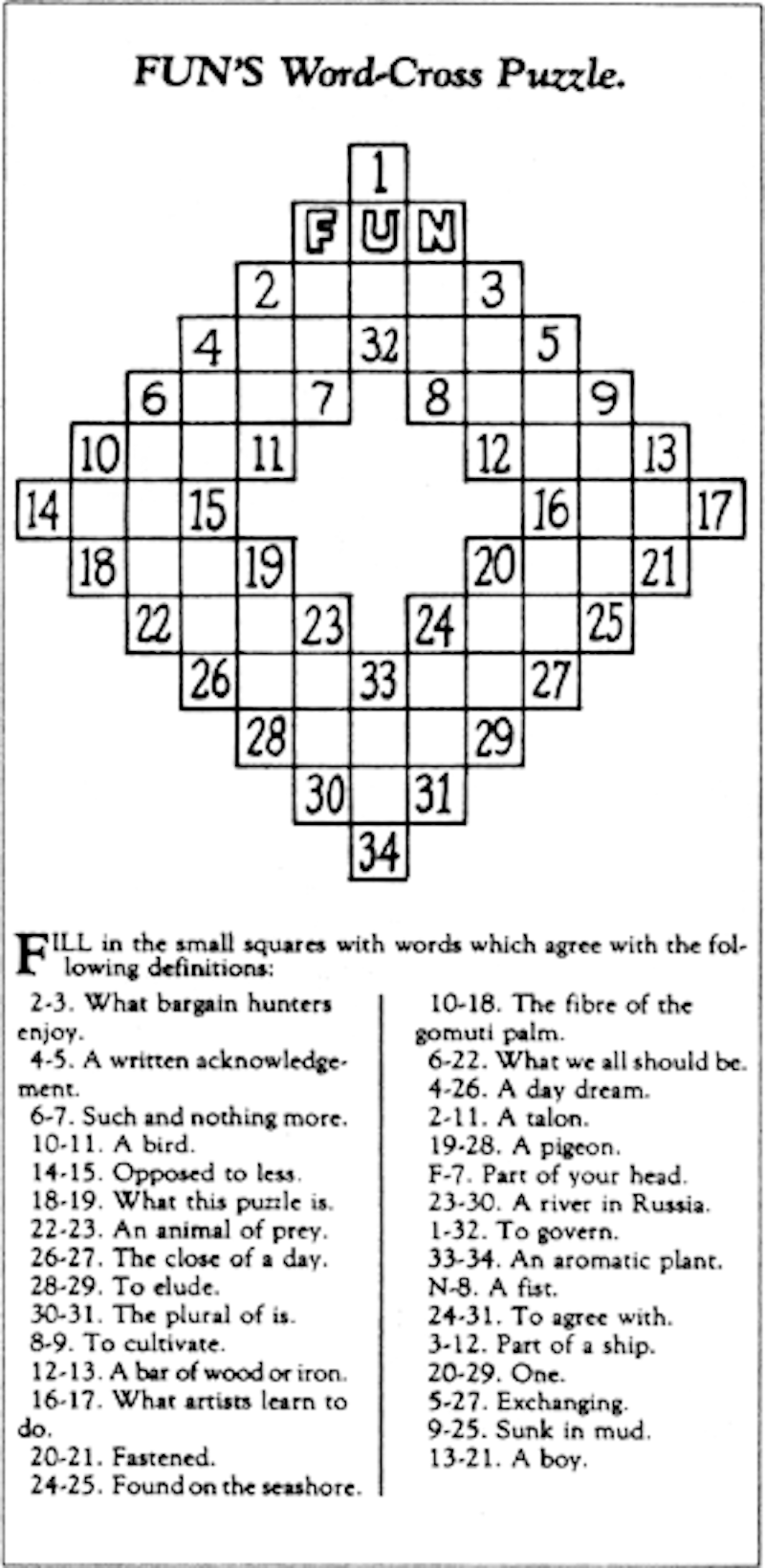
- 1968: Famed lyricist Stephen Sondheim (of Sweeney Todd, Into the Woods, and A Little Night Music) introduces Americans to the British-style cryptic crossword in New York magazine.
- 1969: The prolific Margaret Farrar is succeeded at The New York Times by Will Weng, who is later succeeded by Eugene T. Maleska.
- 1978: The first-ever American Crossword Puzzle Tournament takes place.
- 1993: Will Shortz, the famed crossword puzzle editor of The New York Times, begins his career. The next few decades are sometimes referred to by crossword fans as “the Shortz era.”
- 1996: A puzzle by Jeremiah Farrell published in The New York Times on the day of the U.S. presidential election is a Shrodinger puzzle; 39 Across, “Lead story in tomorrow’s newspaper (!),” can be either BILL CLINTON ELECTED or BOB DOLE ELECTED, and the rest of the puzzle works either way.
- 2006: A documentary film about crossword editor Will Shortz is released, called Wordplay.
- 2007: Roger Squires of the UK is officially recognized by Guinness World Records for being the most prolific crossword compiler as he publishes his 66,666th crossword.
- 2015: The book Two Across by Jeff Bartsch tells the story of a romance in which two brainy people communicate their love via clever crosswords.
- 2016: The world’s largest published crossword, according to Guinness World Records, is published in Japan. It has 66,666 clues and measures 12 square miles.
- 2018: Despite the fact that female editors have been important to crossword construction for many years, there has been a distinct drop in female crossword editors and constructors in the Shortz era. To combat this, two different projects — Women of Letters and The Inkubator — seek to highlight female crossword creators.
- 2018: Crossword fans now have access to popular apps like Word Crossy. Cheats and answers can be found quickly but often call for real-life purchases.
- 2019: What was once a romance for a novel becomes a novel romance in real life when Will Shortz helps a crossword fan propose.
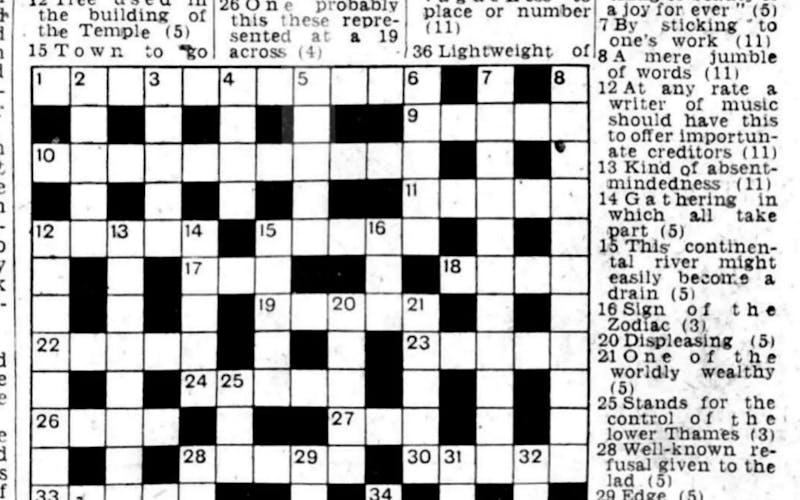
DIY: How to Create a Crossword Puzzle for Students
If you’re a teacher or a parent trying to learn how to create a crossword puzzle as an educational tool, it’s quite easy!
You’ll need a crossword-maker. Here are a few places where you can make your own free printable crossword puzzles for kids:
- Discovery Education’s Puzzlemaker
- The Teacher’s Corner Crossword-Maker
- Armored Penguin’s Crossword Puzzle-Maker
- Crossword-Maker by Tools for Educators
- ABCYA.com’s Easy Crossword Puzzle-Maker for Kids
If you really want to get fancy with your crosswords, you can also create a crossword puzzle with a program like Crossword Compiler for Windows or CrossFire by Beekeeper Labs.
Once you have the program installed, follow these steps:
- First, choose your theme. Even the pros tend to start this way.
- Pick out some words. If you’re a teacher, gather a list of vocabulary words on your topic. If you’re doing this for fun, you might want to start by finding words and phrases around your crossword’s theme. Pick out the longest and most complicated words you want to include first.
- Map out your grid. If you’re using a simple or free crossword-maker, you can move on to creating your list of clues. If you want to create an in-depth, professional-looking crossword, you’ll want to map out your grid first before moving onto the next step. Professional grids are typically in symmetrical squares; The New York Times crosswords are typically 15 squares by 15 squares.
- Create your clues. The standard is that clues are typically not full sentences, do not feature punctuation (unless you want to indicate a trickier clue with a question mark or include “_” for a fill-in-the-blank clue), and are as short as possible. Also, consider not simply using crossword definitions but instead including relevant pop culture references, obscure or alternative synonyms, and different ways to think about simple words. For instance, the answer “Oreo” could be “cream-filled cookie,” “Nabisco treat,” or “popular ice cream flavor.” Thinking outside of the box will make your crossword puzzle more difficult. More complicated clues may use tricks like homonyms or reversals. (See our notes on cryptic crosswords.)
- Fact-check your answers/clues. Make sure your clues and answers are fact-based, rather than opinion-based, and that they’re accurate. If your goal is to make your crossword easier for kids, take the time to try to think of alternative answers to your questions to make sure they’re not misleading.
Tips From the Pros
It sounds very simple, but the process of creating your own crossword can get more complicated.
- Matt Gaffney likes to start with the theme and then use a divide-and-conquer approach to create his crosswords.
- Dan Caprera uses the 15x15 standard grid to his advantage and prefers short clues.
- Ben Tausig and Finn Vigeland are very passionate about themes.
Did you know that you can actually submit your crosswords to be published? If you’re feeling confident, you can submit your finished, formatted puzzle to places like The New York Times, The Wall Street Journal, or Simon & Schuster.
Use our online crossword-solver to get better at finding crossword solutions quickly, and you may be able to master even the Saturday puzzles! We’re the ultimate word-game helper, with dozens of tools, word-finders, word counters, and guides to help you master whatever you might be playing, from Scrabble to Words With Friends to other popular word games. Solve every crossword clue and get the help you need with our solver today! Read Less
© 2020 - 2024 Copyright: crossword-solver.io







